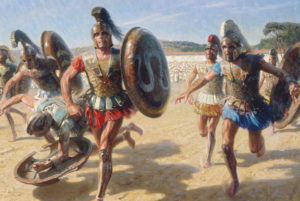[Greek] ἄθλησις (athlēsis), [Latin] passio: contest, conflict, struggle, fight, competition, combat, trial, affliction; Heb.10:32

Olympic event: soldiers (with shields and armor) run a foot race
Background Information:
Greek Hellenism: The first ancient Olympic Games can be traced back to 776 BC. These games were dedicated to the Olympian gods on the ancient plains of Olympia. They continued for nearly twelve centuries until Emperor Theodosius decreed in 393 A.D. that such pagan cults be banned. All male Greek citizens, regardless of their social status, were entitled to participate in these games. Married women were not allowed to participate or to watch these games. Single women were able to attend the competition.
Olympic events: Running, long jump, shot put, javelin, mixed martial boxing and wrestling, boxing, foot race (with armor and shield), and equestrian events.
Old Testament: The book 4 Macc. is not included in the Septuagint. 4 Macc.17:14 refers to a competition against a tyrant, with the world and the human race as the spectators. 4 Macc., written between 1st century B.C and 1st century A.D., was a blending of both Jewish faith and Hellenistic philosophical ideas. The author was writing to the Hellenized Jews. This book was written during the time of the Jewish persecution. The Emperor Claudius issued an edict in 49 A.D. ordering the Jews to leave Rome. 4 Macc.17:14 refers to martyrs who endured in their fidelity to God. They received their ultimate victory of salvation in remaining faithful in their reverence to God. This theme continues years later in the persecution of the Jewish Christians in Jerusalem.
New Testament: Following the resurrection of Jesus, the Jewish Christians experienced persecution from the Jews in Jerusalem. Steven and James, the brother of John the disciple, were martyred at the hands of the Jewish leaders. The book of Hebrews, written around 64 A.D., was written to the Jewish Christians.
Scripture:
“Remember the days past when, after you had been enlightened, you endured a great contest suffering.” Heb. 10:32
This enlightenment is an ancient metaphor for baptism. This scripture passage refers back to the earlier persecution of the Jewish Christians in Jerusalem. These Hebrew Christians had once successfully endured a great struggle with suffering. Like good athletes, they were encouraged to endure and to do God’s will. In doing so, they might receive their promise (victory).
Ignatius’ Letter to Polycarp (110 A.D.): “Bear the maladies of all as a perfect athlete. Where there is more toil, there is much gain.”
Ignatius, a disciple of the Apostle John, was writing to the younger Polycarp, the bishop of Smyrna. Ignatius was encouraging Polycarp to lead his followers and to remain firm in the face of adversity, persecution, and even martyrdom.
Conclusion:
Athletic, athlete, athletics, passion
It was interesting to discover how the meaning of this term changed over time. Although beginning as a sports contest, the meaning took on much more serious undertones during the persecutions of the Jews and Christians. These contests now involved persecution and martyrdom. A strong athlete was one who endured these faith struggles. Now this term is predominately used again with sports. Not surprisingly today, an athlete must have discipline and training in order to confidently face his opponents (adversaries).
In fact, this term plays a role in how Aquila and Prisca encountered Paul in Ephesus. Emperor Claudius’ edict forced Aquila and Prisca out of Rome. Aquila and Prisca were some of the early leaders of the Roman church. It is really not important that 4 Macc. is not considered part of the Septuagint. However, this book helps to shed some light on how the Jews were being persecuted for their faith.
Fellow Christians, make a good run of it in your lives.
